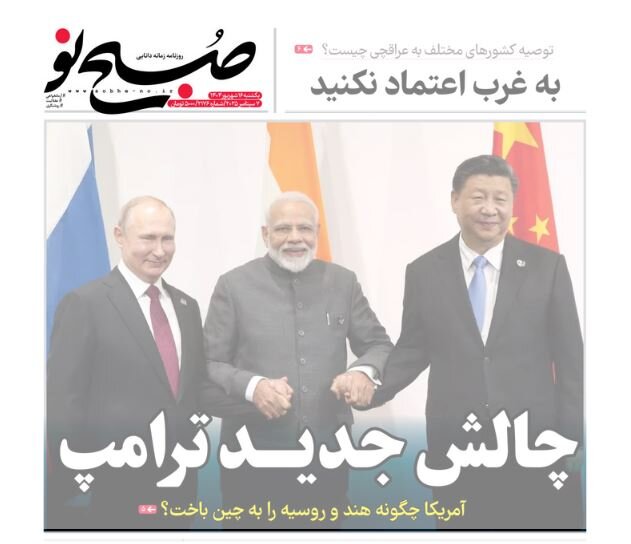Iran's defense line on the international stage

TEHRAN - In an analysis, Sobh-e-No highlighted the pivotal role of Iran’s diplomatic apparatus, writing: Foreign Minister Seyyed Abbas Araghchi has played a central role in Iran's resistance diplomacy in recent months.
He has engaged in negotiations not only with member states of the Security Council but also with European institutions to clearly and decisively articulate Iran's position. Araghchi recently held strategic phone calls with three non-permanent members of the Security Council—Greece, Slovenia, and Sierra Leone. In these conversations, he described the actions of three European countries as “illegal, unjustified, and irresponsible,” emphasizing that while Iran remains committed to diplomacy, it will be uncompromising in defending its legitimate rights. These calls reflect Iran’s effort to curtail international support for European measures and to garner backing from countries capable of adopting a balanced stance within the Security Council. More significantly, the foreign ministers of these three countries responded by stressing the importance of diplomatic solutions and the need to prevent further escalation. Their reaction signals a rift in European positions and a lack of unity within the European Union.
Arman-e-Melli: why won’t China implement the 25-year agreement with Iran?
In an article, Arman-e-Melli explored the reasons behind the non-implementation of China’s 25-year agreement with Iran. The paper stated: There are several contributing factors. First, China maintains close relations with Arab countries and Israel, and has made substantial investments in Israel. Additionally, China has yet to detach itself from the trillion-dollar U.S. market, and therefore will not compromise its national interests to support Iran. The agreement between Iran and China remains unimplemented and likely will not be realized in the future—especially now that the snapback mechanism has been raised, and the trajectory of the situation remains uncertain. We must wait and observe how the snapback mechanism unfolds. With the reimposition of sanctions, the dynamics will become increasingly complex, and we hope that in the remaining days before the mechanism is activated, Iran will make a flexible decision to mitigate further harm.
Jam-e-Jam: maximum pressure—from espionage to security council provocation
In a commentary, Jam-e-Jam addressed the Agency’s admission of espionage, stating: The recent actions of the Agency and the European troika are part of the West’s maximum pressure campaign against Iran. The Agency’s reports on Iran’s enriched uranium reserves reaching 60%—which, according to the Associated Press, brings Iran close to “weapons level”—lack credible evidence and have been dismissed by Tehran as politically motivated. At this critical juncture, the Islamic Republic of Iran has once again demonstrated, through targeted negotiations and extensive consultations, that it will neither yield to unlawful Western pressure nor relinquish initiative. The revelation of the Agency’s espionage, confirmed by its own admission, underscores the oppressive nature of the current global order and calls for heightened vigilance from Iranian officials. The Vienna and Doha talks, along with consultations with Security Council members, all attest to Tehran’s resolute commitment to preserving its independence and scientific advancement in the face of Western conspiracies. It is now the West and the International Atomic Energy Agency (IAEA) that must be held accountable for their breaches of commitment, espionage, and hostile actions.
Javan: America’s strategy is to maintain its superpower status
Javan commented on Trump’s renaming of the U.S. Department of Defense to the Department of War, writing: Trump changed the name of the Department of Defense to the “Department of War” with a single signature. After World War II, the United States—having remained distant and untouched by the war zone—emerged as a global superpower by aiding Russia against the German army via the “Bridge of Victory” in Iran, and helping China defeat Japan, culminating in Japan’s surrender following the atomic bomb. Today, this name change under the Trump administration is not merely symbolic, but a strategic move aimed at instigating new conflicts around the world to weaken emerging powers and preserve U.S. dominance. The U.S. has attacked Iran, is preparing for conflict with Venezuela, is engaged in a proxy war with Russia over Ukraine, and is planning confrontation with China—at least through support for Taiwan. War and the weakening of rivals represent America’s final strategy to maintain its superpower status. Defense analysts and think tanks overwhelmingly agree that a name change alone will not enhance America’s operational capabilities or strategic balance.
Leave a Comment